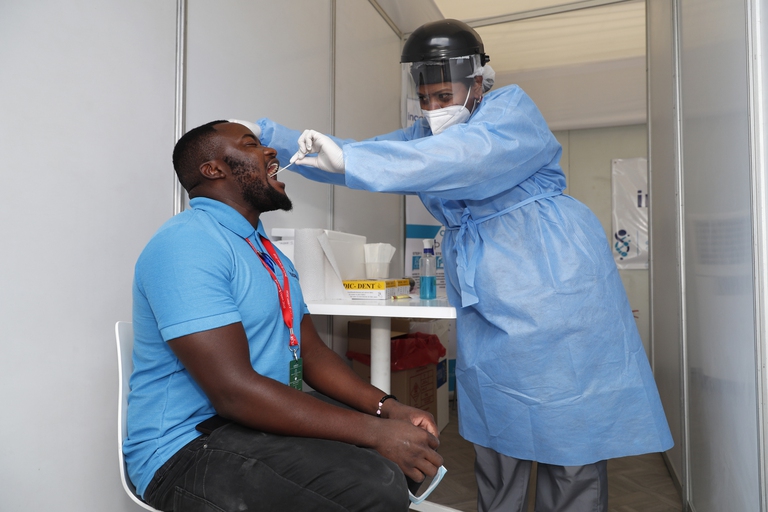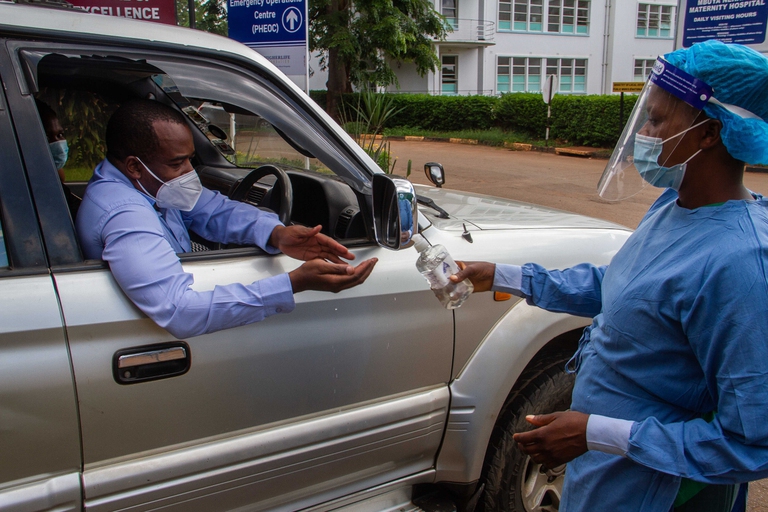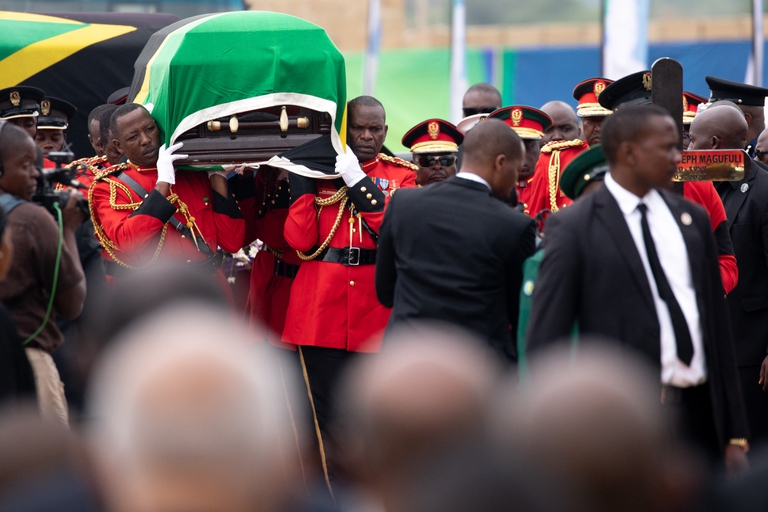
The second wave of the Covid-19 pandemic has shone a painful spotlight on the dire conditions of tea garden workers struggling against poverty in India.
While Africa’s Covid-19 response has been praised by some, the pandemic has triggered the continent’s first recession in 25 years.
The coronavirus pandemic continues to spread worldwide, with high numbers of fatalities reported in the Chinese city of Wuhan in the first months of last year, followed by even higher numbers in Italy, Spain, the UK and USA and other developed countries with strong health care systems. The recent global death toll compiled by Johns Hopkins University shows that over 2 million people have lost their lives in the pandemic. However, most African countries continue to experience lower mortality rates notwithstanding their more fragile healthcare systems, thus defying the World Health Organisation (WHO)’s worst predictions.
In May 2020, the United Nations’ health agency warned that an estimated 190,000 people in Africa could die of Covid-19 in the first year of the pandemic, and that the disease could “smoulder” across the continent for years.
However, as of July 2021, Africa has officially registered more than 4.8 million cases and 130,000 deaths, according to the WHO, data representing 2.9 percent of global cases and 3.7 percent of deaths.
In recent weeks, the continent has seen a rise in infections. South Africa, officially the most affected African country, has tightened health restrictions and now has more than 1.6 million cases and 56,439 deaths.
President Cyril Ramaphosa recently announced that South Africa’s Covid-19 restrictions will be strengthened as the country moves to an adjusted level 2 lockdown. The president disclosed that South Africa is moving into a third wave of Covid-19 infections. Over the last seven days, he said that the country has seen an average of 3,745 daily new infections.
“The proportion of Covid-19 tests that are positive has more than doubled in the last month from around 4% to more than 11%, even as we have increased testing across the country. We are advised that a positivity rate of over 5% is a cause
“Africa’s swift and multilateral response to the pandemic contributed largely to its initial success in controlling the spread of the virus, though some countries such as South Africa still experienced significant outbreaks,” is the assessement of a report by Columbia University and the Brenthurst Foundation. “As soon as the first African case of Covid-19 was reported in Egypt, African leaders quickly realised the Covid-19 pandemic was not a disease they could fight with ventilators; given the poor state of the health care systems, they quickly implemented virus safety awareness public health campaigns and containment measures”.
John Nkengasong, Director of the Africa Centres for Disease Control and Prevention, who helped steer the continents’ 54 countries in responding to the pandemic – rather effectively in some cases – urged them not to wait for help. He rejected what he described as an image of the continent holding a begging bowl, insisting that Africa could stand up to fight the crisis if given the chance.
Despite early preparedness, the pandemic has strained fragile health care systems and has also disrupted non-Covid-19 related healthcare services such as antenatal and emergency care, and access to life-saving medications. This setback threatens to erode decades of progress in reducing disease and increasing life expectancy in Africa.
However, the International Monetary Fund (IMF) has warned that the economies of countries in Sub-Saharan Africa (SSA) have been hurt badly by the Covid-19 pandemic. In 2020, the IMF projected that their economies would contract by 3.3 per cent, the first recession in 25 years. “Growth is projected to recover to 3.4 per cent in 2021 subject to the continued gradual easing of restrictions that has started in recent weeks and, importantly, if the region avoids the same epidemic dynamics that have played out elsewhere,” the financial institution wrote in June 2020.
Yet Zambia became Africa’s first Covid-19 casualty in terms of defaulting on it debt, in this case Eurobonds worth 42.5 million US dollars. Prior to the pandemic, the Southern African country was due to pay 1.7 billion dollars to service its foreign debt in 2020. Official documents from the World Bank show external debt rising by 11 billion dollars at the end of 2019, compared to 8.74 billion dollars a year earlier.
Other indebted countries are likely to follow in Zambia’s footsteps, including Angola, which borrowed more than 43 billion dollars from China between 2000 and 2018. Next are Ethiopia and Kenya, with 14 and 9 billion dollars in debt respectively.
Tanzania’s President John Pombe Magufuli died, from heart complications according Mrs. Samia Suluhu Hassant, the vice president who has since be sown in to become Tanzania’s firsrt female president.
Mr Magufuli had not been seen in public for more than two weeks, and rumours had been circulating about his health. Critics said that Mr. Magufuli had contracted Covid-19, but the government denied.
Mr Magufuli was one of Africa’s most prominent coronavirus sceptics, months before his death, he claimed that inhaling steam is an effective treatment against coronavirus, claiming without scientific evidence that the virus dies because it is very oily.
There are no publicly available records for recent deaths in Tanzania, and no information has been released on the impact of coronavirus since May last year, when 500 cases and 20 deaths were reported up to that point.
The authorities have insisted there is little to worry about, and have taken tough action against those they accuse of spreading “false information”.
In addition, Mike Sonko, the governor of Kenya’s capital Nairobi recently faced a severe backlash for misleading remarks about alcohol and the coronavirus. Sonko was explaining why he is including bottles of Hennessy cognac in food supplies for vulnerable people in the city, saying it would serve as a throat sanitiser.
Many Africans remain pessimistic about whether their governments will be transparent enough in administering medical resources to counter the effects of Covid-19. For instance, in Kenya, equipment packages donated by the by Chinese billionaire Jack Ma were illicitly sold, lost or wasted. Furthermore, the government has reported that an estimated 400 million dollars in funds allocated towards to responding to the pandemic have vanished and the culprits haven’t been arrested. But if ever there was a case highlighting the painful reality of the dangers of corruption, it is the scandal surrounding Zambian Health Ministry officials who stole million dollars in the form of cash, pledges and aid donations destined for the Covid-19 response.
In addition, in June last year the ministry awarded a tender worth 17 million dollars for the procurement of health kits to Honey Bee pharmacies, even though it was found that the company wasn’t even registered and had no physical address when the contract was awarded.
Siamo anche su WhatsApp. Segui il canale ufficiale LifeGate per restare aggiornata, aggiornato sulle ultime notizie e sulle nostre attività.
![]()
Quest'opera è distribuita con Licenza Creative Commons Attribuzione - Non commerciale - Non opere derivate 4.0 Internazionale.
The second wave of the Covid-19 pandemic has shone a painful spotlight on the dire conditions of tea garden workers struggling against poverty in India.
In response to a lack of public services, organisations and individuals are helping citizens weather the devastating Covid-19 crisis in India.
A study indicates that the zoonotic origins of coronavirus may have been favoured by global warming’s impact on the conditions for bat habitats.
In Coronation, a documentary filmed by the people of Wuhan, the dissident Chinese artist documents the government’s rigid control during lockdown.
David Nabarro of the WHO analyses worldwide actions against the pandemic. Lockdowns alone aren’t a sustainable response to stopping Covid-19.
Kenya may fail to meet its target of ending female genital mutilation by 2022 as Covid-19 school closures have seen more girls undergo the illegal practice.
Helsinki Airport has begun implementing a Covid-19 test which is both noninvasive and simple. The exceptional nurses involved are dogs.
The drop in air pollution during worldwide lockdowns helped prevent thousands of premature deaths. But the situation is returning to pre-crisis levels.
The pandemic threatens some of the world’s most endangered indigenous peoples, such as the Great Andamanese of the Andaman and Nicobar Islands in India.











